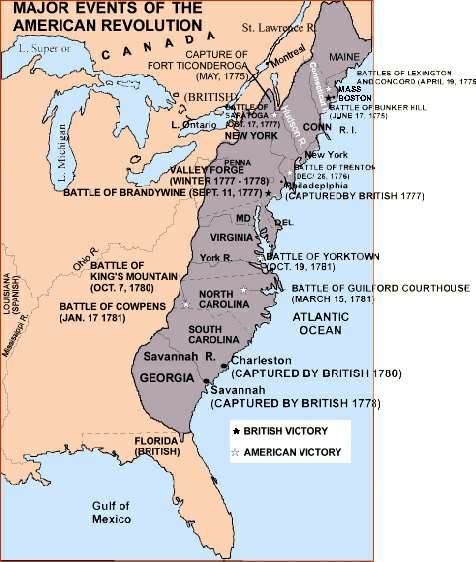|
PinkMonkey Study Guide - American History
3. 6 War and Peace
During the war with Britain, America found an ally
in France. Right from 1775, France had been supplying arms and loans
to the Continental Congress.
In 1778, a formal alliance was signed between the
two countries. Most of the battles were fought in the south. The
defeat of British troops in York town (1781) led to the surrender
of Lord Cornwallis. This was the last important battle during
the war. This war with the British Empire - lasted for eight years.
The result was the birth of a new nation. The negotiations for peace
began to be initiated by both belligerent countries. The talks dragged
on for almost two years.
The American Revolution

Click here for Enlargement.
Exhibit 3.3
The Franco-American Alliance (1778) prevented the
U.S. from making a separate peace. On the other hand, Louis XVI
of France and his minister Vergennes (in order to get Spanish support
in the war) had promised the Spanish ministry a large portion of
the British territory (in America) as war booty.
Under these circumstances, Alexander Hamilton representing
the new nations went ahead and opened separate negotiation with
the British. Though this was in violation of the Franco-American
alliance, Hamilton was aware that the French would not be able to
take Army retaliatory action as France had been weakened by a long
and expensive war). This diplomatic foresight on the part of Benjamin
Franklin led to the breaking of the deadlock. A series of treaties
were signed to end the war.
Benjamin Franklin

Exhibit 3.4
During the talks, young Benjamin Franklin secured
a diplomatic victory for America. Britain and America signed a peace
Treaty in 1783. Under this Treaty - the Treaty of Paris (1783),
Britain recognized the independence of the colonies and promised
to withdraw its troops. The new nationís boundary extended from
the Atlantic coast to the Mississippi River. Its boundaries in the
north were still unclear, since British troops still controlled
forts south of the Great Lakes. The Gulf coast was ceded to Spain,
though both America and Britain were given navigation rights on
the River Mississippi. The Treaties also required the U.S. to compensate
the loyalists who had suffered financial loss during the war. The
British also closed its ports to the U.S. Inspite of these concessions,
all in all the Americans benefitted due to the European rivalries
and a lack of adequate enforcement clauses in the Treaties.
[Next Page]
|